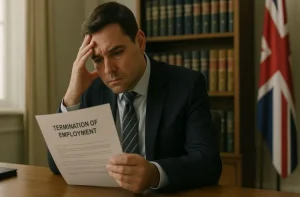Have you ever wondered whether your employer could terminate your job without giving you any prior warning? What if you walked into work one morning, only to find out you were being dismissed, with no written explanation or formal warning beforehand?
For many UK employees, the fear of sudden termination is real. It often raises confusion around what is legally allowed and what counts as unfair dismissal. While workplace laws are designed to protect both sides, not every termination requires a written warning.
There are certain cases, such as gross misconduct or serious breaches of contract, where an employer can lawfully dismiss an employee without any prior written warning.
In this blog, we’ll explore the complete picture behind dismissals without written warnings in the United Kingdom. By understanding the legal rules, both employers and employees can approach disciplinary matters more confidently and avoid unnecessary legal disputes.
What Does UK Law Say About Being Sacked Without a Written Warning?

UK employment law does not state that an employer must always issue a written warning before dismissing an employee. Instead, the focus is on fairness and procedure.
The law, guided by the Employment Rights Act 1996 and the ACAS Code of Practice, defines a dismissal as fair if it meets two main criteria:
- The employer has a valid and justifiable reason for the dismissal.
- The employer follows a fair process in handling the matter.
Fair reasons for dismissal generally include poor performance, misconduct, redundancy, breach of statutory duty, or some other substantial reason such as restructuring.
However, the employer must act consistently. This means they cannot dismiss one employee for a certain behaviour while allowing others to continue with similar actions.
They must also ensure a reasonable investigation has taken place. For instance, if an allegation of misconduct arises, the employer should collect facts, interview witnesses if necessary, and allow the employee an opportunity to explain before any decision is made.
The absence of a written warning does not automatically make the dismissal unfair. What matters is whether the employer acted reasonably under the circumstances and whether the employee was given a fair opportunity to respond to allegations.
When Is It Legal To Sack An Employee Without A Written Warning In The UK?
There are specific situations where employers are legally permitted to dismiss an employee without issuing a written warning.
These usually occur when the conduct or actions of the employee are so serious that they justify summary dismissal, meaning immediate termination without notice.
Some common examples include theft, physical violence, fraud, gross negligence, or deliberate damage to company property. In such situations, written warnings are not required because the employment relationship has effectively been broken by the employee’s behaviour.
Even so, the employer must still demonstrate fairness. This involves carrying out an investigation and giving the employee an opportunity to state their case before making the final decision.
Here’s a table summarising the difference between dismissals that require warnings and those that don’t:
| Type of Dismissal | Written Warning Required | Example |
|---|---|---|
| Poor performance | Yes, usually | Repeated mistakes despite training |
| Minor misconduct | Yes | Being late or missing meetings |
| Gross misconduct | No | Theft or violence |
| Redundancy | No | Company downsizing |
| Health-related incapacity | Not always | Long-term illness affecting work |
The key principle remains the same: even if a written warning isn’t necessary, a fair process must always be followed. If the employer fails to follow that process, the dismissal may still be considered unfair.
How Do Employers Justify Immediate Dismissal Without Written Warnings?

Employers in the UK must be able to justify dismissing an employee without any prior written warning. This justification rests on having a valid reason supported by evidence, as well as following a fair and transparent process.
The justification process typically includes investigating the issue thoroughly, informing the employee of the allegations, and holding a disciplinary meeting to hear their side.
This meeting should allow the employee to bring a companion or representative for support. Only after this process can the employer decide whether dismissal is justified.
The ACAS Code of Practice is particularly important here. While not legally binding, it’s widely recognised in employment tribunals. Employers who fail to follow it can face increased penalties if the dismissal is found to be unfair.
Evidence also plays a critical role in justification. Employers should document incidents, witness statements, or other forms of proof.
For example, in a case of theft, CCTV footage or transaction records might serve as supporting evidence. When documentation and due process are in place, even a dismissal without written warnings can be lawful.
However, employers who skip these steps, dismiss impulsively, or fail to investigate properly risk facing an unfair dismissal claim.
What Role Does Gross Misconduct Play In Instant Dismissal?
Gross misconduct is one of the few areas where an employer can legally dismiss an employee without any prior warnings or notice. It refers to behaviour so severe that it destroys the trust and confidence between employer and employee.
Examples of gross misconduct often include theft, physical assault, fraud, or serious health and safety violations. In such cases, the act itself is considered sufficient justification for termination. However, a fair process must still take place.
The employer should investigate the matter, meet with the employee to discuss the findings, and then decide whether dismissal is appropriate.
Gross misconduct dismissals are often referred to as summary dismissals because they take effect immediately, without notice pay. Despite the urgency of such cases, employers are still encouraged to handle them carefully to avoid claims of wrongful or unfair dismissal.
For example, if an employee is accused of violence, they may be suspended with pay while the investigation continues. Only once evidence confirms the behaviour should the employer proceed with dismissal.
Even though written warnings are unnecessary in these cases, fairness, transparency, and documentation are still essential for the dismissal to hold up legally.
Are Employees Always Entitled To A Verbal Or Written Warning First?
Not always. The need for a written or verbal warning depends on the nature and seriousness of the issue. In most cases of poor performance or minor misconduct, it’s considered good practice for employers to issue at least one written warning before dismissal. This gives the employee a chance to improve or correct their behaviour.
The process typically follows a staged approach:
- Verbal or informal discussion about the issue.
- First written warning outlining required improvements.
- Final written warning if performance or behaviour doesn’t improve.
- Dismissal if the employee still fails to meet expectations.
However, where the matter is more serious, such as deliberate misconduct or repeated violations, the employer may move straight to dismissal without warning.
Employers should still document any discussions, meetings, and outcomes, even if a written warning isn’t formally issued. This documentation is useful if the case is ever reviewed by a tribunal.
Can I Be Sacked Without a Written Warning UK? – A Real Case Example

A real employment tribunal case from 2024 highlights how the law interprets dismissals without written warnings.
An employee working for a retail chain was found to have deliberately falsified refund transactions for personal gain. The employer investigated, found clear evidence, and held a disciplinary hearing where the employee admitted to the misconduct. They were dismissed immediately without any prior warning.
The employee claimed unfair dismissal, arguing that no written warning was issued. However, the tribunal ruled in favour of the employer, stating that the offence amounted to gross misconduct, and the process followed was fair and compliant with employment law.
This case reinforces that while a written warning can be a key part of disciplinary action, it’s not a mandatory requirement for all dismissals. What matters most is whether the employer acted reasonably and in line with fair procedure.
What Happens If An Employer Skips The Disciplinary Process?
If an employer dismisses someone without following a fair disciplinary process, even when there’s a valid reason, the dismissal can be deemed unfair. This means the employer might be required to compensate the employee or even reinstate them.
The disciplinary process outlined by ACAS includes several essential steps:
- Investigating the issue properly.
- Informing the employee of the allegations in writing.
- Holding a disciplinary hearing.
- Allowing the employee to respond and be accompanied.
- Providing an appeal opportunity.
Failure to adhere to this framework could result in financial penalties. For example, employment tribunals may increase compensation by up to 25% for non-compliance with the ACAS Code.
Employers should therefore view procedural fairness not as a formality but as a legal necessity. Consistent, transparent processes protect both sides and strengthen workplace integrity.
What Are My Rights As An Employee Facing Dismissal Without Warning?
Every employee in the UK is protected by certain legal rights during the dismissal process. These rights ensure that employers act fairly and transparently.
If facing dismissal, an employee has the right to know the reasons behind it and the evidence supporting those reasons. They also have the right to attend a disciplinary hearing, bring a colleague or trade union representative, and appeal against the decision.
Employees who have worked continuously for two years or more also have the right to request a written explanation for their dismissal. If the dismissal occurs while on maternity leave, this right applies regardless of how long the person has worked for the employer.
If any of these rights are violated, the employee may bring an unfair dismissal claim before an employment tribunal. The tribunal will examine whether the dismissal was based on a fair reason and whether the procedure was handled reasonably.
Employees should keep detailed records of all communications and events leading up to their dismissal, as these can serve as valuable evidence later.
How Should I Respond If I’m Terminated Without A Written Warning?

Being dismissed without a written warning can be unsettling and stressful. However, employees are not powerless in this situation. There are clear, proactive steps you can take to respond effectively and protect your legal rights.
Steps to Take After Termination Without a Written Warning
- Request a written explanation for your dismissal from your employer
- Gather all relevant documentation, such as emails, messages, or performance appraisals
- Review your employment contract and the staff handbook to understand the employer’s disciplinary process
- Submit a formal appeal using your employer’s internal grievance or appeal procedure
- Contact ACAS to begin early conciliation if the internal appeal fails
- Seek advice from an employment solicitor to assess the legality of the dismissal and prepare for possible tribunal proceedings
By following these steps, you can ensure your dismissal is reviewed fairly and that your employment rights are respected. Whether you’re aiming for reinstatement or compensation, taking timely action can make a meaningful difference in the outcome.
Can I Challenge An Unfair Dismissal Successfully In The UK?
Yes, if an employee believes they have been dismissed unfairly, they can challenge the decision by filing a claim for unfair dismissal. The claim must typically be made within three months less one day of the dismissal date.
Before filing, they must go through the ACAS Early Conciliation process, which aims to resolve disputes without a formal tribunal. If no resolution is reached, ACAS will issue a certificate allowing the claim to proceed.
The employee must show that the dismissal was either not for a fair reason or that the employer failed to follow a reasonable procedure. Evidence such as correspondence, meeting records, or witness statements can strengthen the case.
Outcomes of successful claims may include financial compensation, reinstatement, or re-engagement in another role. The exact result depends on the circumstances and the tribunal’s findings.
Conclusion
In the UK, an employer can dismiss an employee without issuing a written warning, but only under certain conditions. Situations like gross misconduct, severe breaches of contract, or redundancy may justify dismissal without warning.
However, fairness remains the foundation of employment law. Employers must always follow a fair and transparent process before taking action. If an employee believes this hasn’t happened, they have the right to challenge the decision.
For employees, understanding your legal rights is the first step towards protecting your career. For employers, maintaining fair procedures ensures compliance and builds a workplace grounded in trust and respect.
Frequently Asked Questions
Can I be dismissed without a written or verbal warning?
Yes, but only in specific cases such as gross misconduct. Employers must still follow a fair process.
Is a written warning legally required before dismissal?
No, it depends on the seriousness of the issue. Not every dismissal requires one.
What qualifies as a fair dismissal?
A fair dismissal is one based on a valid reason, handled with proper investigation and process.
Can I take legal action after being sacked without warning?
Yes, if you believe the dismissal was unfair or unlawful, you can challenge it at a tribunal.
How soon must I act after being dismissed unfairly?
You must start the ACAS Early Conciliation process within three months less one day.
Can I be dismissed for a single mistake?
It depends on the severity. Minor errors usually warrant a warning, but serious misconduct may justify dismissal.
What happens if I’m dismissed during maternity leave?
You are entitled to a written explanation for your dismissal regardless of your length of service.
{
“@context”: “http://schema.org/”,
“@type”: “FAQPage”,
“mainEntity”: [
{
“@type”: “Question”,
“name”: “Can I be dismissed without a written or verbal warning?”,
“acceptedAnswer”: {
“@type”: “Answer”,
“text”: “Yes, but only in specific cases such as gross misconduct. Employers must still follow a fair process.”
}
},
{
“@type”: “Question”,
“name”: “Is a written warning legally required before dismissal?”,
“acceptedAnswer”: {
“@type”: “Answer”,
“text”: “No, it depends on the seriousness of the issue. Not every dismissal requires one.”
}
},
{
“@type”: “Question”,
“name”: “What qualifies as a fair dismissal?”,
“acceptedAnswer”: {
“@type”: “Answer”,
“text”: “A fair dismissal is one based on a valid reason, handled with proper investigation and process.”
}
},
{
“@type”: “Question”,
“name”: “Can I take legal action after being sacked without warning?”,
“acceptedAnswer”: {
“@type”: “Answer”,
“text”: “Yes, if you believe the dismissal was unfair or unlawful, you can challenge it at a tribunal.”
}
},
{
“@type”: “Question”,
“name”: “How soon must I act after being dismissed unfairly?”,
“acceptedAnswer”: {
“@type”: “Answer”,
“text”: “You must start the ACAS Early Conciliation process within three months less one day.”
}
},
{
“@type”: “Question”,
“name”: “Can I be dismissed for a single mistake?”,
“acceptedAnswer”: {
“@type”: “Answer”,
“text”: “It depends on the severity. Minor errors usually warrant a warning, but serious misconduct may justify dismissal.”
}
},
{
“@type”: “Question”,
“name”: “What happens if I’m dismissed during maternity leave?”,
“acceptedAnswer”: {
“@type”: “Answer”,
“text”: “You are entitled to a written explanation for your dismissal regardless of your length of service.”
}
}
]
}







